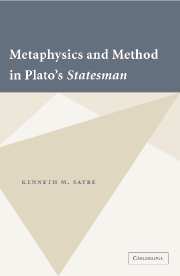Book contents
- Frontmatter
- Contents
- Acknowledgments
- Introduction
- PART I METHOD
- 1 Becoming Better Dialecticians
- 2 Collection in the Phaedrus and the Sophist
- 3 Division in the Phaedrus and the Sophist
- 4 Collection Yields to Illustrative Paradigms
- 5 The Weaver Paradigm
- 6 The Final Definition
- PART II METAPHYSICS
- Appendix: Equivalents for the Great and the Small in Aristotle and His Commentators
- Bibliography
- Index Locorum
- Index of Names
- General Index
3 - Division in the Phaedrus and the Sophist
Published online by Cambridge University Press: 23 November 2009
- Frontmatter
- Contents
- Acknowledgments
- Introduction
- PART I METHOD
- 1 Becoming Better Dialecticians
- 2 Collection in the Phaedrus and the Sophist
- 3 Division in the Phaedrus and the Sophist
- 4 Collection Yields to Illustrative Paradigms
- 5 The Weaver Paradigm
- 6 The Final Definition
- PART II METAPHYSICS
- Appendix: Equivalents for the Great and the Small in Aristotle and His Commentators
- Bibliography
- Index Locorum
- Index of Names
- General Index
Summary
Subdivisions of Mental Derangement in the Phaedrus
With regard to dialectic, the pivotal passage in the Phaedrus is 265D–266C. The passage begins with reference to a pair of procedures, identified shortly thereafter as collection and division, and concludes by assigning the name ‘dialectician’ persons able to apply them. As already noted, collection is described here as a process of bringing what is multiply dispersed “into a single Idea” (Εἰs μίαν … ἰδέαν: 265D3). Division is characterized in turn as a matter of “cleaving things according to Forms” (κατ᾽ εἴδη … διατέμνειν: 265E1) and likened to the technique of cutting “according to natural joints” (κατ᾽ ἄρθρα ᾗ πέφυκεν: 265E1–2) practiced by a competent butcher.
The treatment of collection in the Phaedrus has been discussed in the previous chapter, along with the relationship between collection and recollection (ἀνάμνησις). Our present concern is with the other phase of the dialectical process in which things are partitioned according to Forms.
This technique of cutting things along natural lines of cleavage, Socrates tells Phaedrus, has already been illustrated in his two speeches on love. After locating mental derangement (τὸ … ἄφρον τῆς διανοίας: 265E3–4) under a single common Form (by collection), these two speeches then partitioned off the “left-handed” and the “right-handed” parts of mental derangement (termed παρανοίας at 266A2), analogously to the distinction between the left- and right-hand parts of the body. Let us examine the forms of mental derangement distinguished in these two speeches.
- Type
- Chapter
- Information
- Metaphysics and Method in Plato's Statesman , pp. 52 - 72Publisher: Cambridge University PressPrint publication year: 2006



